Bulgaria's Residential Property Market Analysis 2025
Following a decade of continuous house price increases, Bulgaria’s housing market shows no signs of slowing. Strong demand coupled with limited supply is further intensifying the upward trend.
This expanded analysis from the Global Property Guide provides a detailed look at Bulgaria’s housing market, covering the most recent developments while also tracing the long-term patterns shaping its trajectory.
Table of Contents
- Housing Market Snapshot
- Historic Perspective
- Demand Highlights
- Supply Highlights
- Rental Market
- Mortgage Market
- Socio-Economic Context
Housing Market Snapshot
The nationwide house price index in Bulgaria increased by a spectacular 15.51% during the year to Q2 2025, following year-on-year growth of 15.08% in Q1 2025, 18.27% in Q4 2024, 16.5% in Q3 2024, 15.11% in Q2 2024, and 16.01% in Q1 2024, according to the National Statistical Institute (NSI). In real terms, house prices were up by an average of 10.66% y-o-y in Q2 2025.
Bulgaria's house price annual change:
Note: Bulgaria National House Price Index: All Dwellings (2015 = 100)
Data Source: National Statistics Office in Bulgaria.
Quarter-on-quarter, nationwide house prices rose by 3.83% in Q2 2025 (4.24% inflation-adjusted).
"Property prices continue to rise, and interest in new-build projects remains strong, especially for modern complexes with guaranteed quality. The year also appears to be one of the strongest for a rise in demand for rural houses, which are offered in quite a variety of regions and price ranges," said Bulgarian Properties in its November 2025 report.
By property type:
- Prices of new dwellings rose by a huge 14.88% during the year to Q2 2025, its seventh consecutive quarter of year-on-year price increases and one of the highest growth rates seen in recent history. When adjusted for inflation, prices were up by 10.06%. During the latest quarter, prices of new dwellings increased by 4.82% (5.24% inflation-adjusted).
- Prices of existing dwellings also rose strongly by 16.01% (11.15% inflation-adjusted) in Q2 2025 from a year earlier, up from the previous year's 14.81% increase. Quarter-on-quarter, existing house prices were up by 3.21% (3.61% inflation-adjusted).
The continued strong house price growth is supported by robust demand. In the second quarter of 2025, the number of residential property transactions in Bulgaria rose by a modest 2.8% from a year earlier, following y-o-y growth of 2.9% in the previous quarter and 9.9% a year ago, according to figures from the NSI. On the other hand, transaction value experienced a more rapid growth of 23% y-o-y in Q2 2025, after increasing by 21.5% in the previous quarter and 30.2% a year earlier.
Beyond strong domestic demand, Bulgaria is also seeing a steady rise in foreign homebuyers. EU citizens are now allowed to purchase all types of property in the country, including land. This marks a significant shift from the pre-January 2012 rules, when foreign nationals could acquire land only through a legal entity and were prohibited from owning it directly.
"Demand remained strong and was not met by available supply, which kept property prices high. New construction is trying but failing to meet all demand. Still, we can say that new construction has been the most preferred by buyers over the last 10 years, and this trend remains persistent," said Bulgarian Properties.
During 2024, Bulgaria's economy expanded by a moderate 3.4% from a year ago, following annual growth of 1.9% in 2023, 4% in 2022, and 7.8% in 2021, driven primarily by domestic consumption, as well as public and private investment.
In the third quarter of 2025, the country's economic growth stood at 3.2% from a year earlier, following a year-on-year expansion of 3.4% in the previous quarter and 2.8% a year ago, based on NSI figures. Quarter-on-quarter, the economy grew by 0.7% in Q3 2025, slightly easing from a 0.9% gain in the previous period.
Bulgaria's economy is projected to continue expanding at a moderate pace, with the European Commission and the International Monetary Fund (IMF) both expecting the Bulgarian economy to post another growth of 3% this year.
"The economy is operating above potential, with tight labor markets. GDP growth is projected to be strong at around 3 percent in 2025 and 2026. This expansion is supported by sustained private consumption, underpinned by strong credit growth and fiscal easing," said the IMF. "After contracting last year, investment is also growing again. However, external demand for Bulgaria's exports is expected to stay subdued, reflecting slower growth in key EU markets and global uncertainty."
Bulgaria's GDP per capita increased by a whopping 417% in the past two decades, reaching US$17,400 in 2024. The IMF expects the country's GDP per capita to breach the USD 20,000 mark this year.
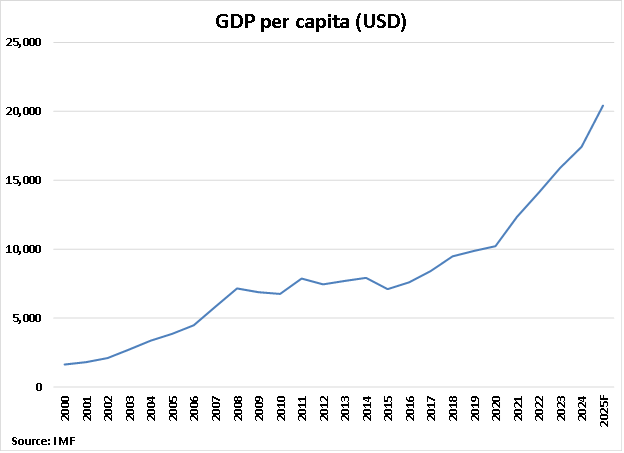
Local house price variations
Most of Bulgaria's major cities continue to register strong house price rises during the year to Q2 2025.
- Sofia, Bulgaria's capital, saw a strong house price growth of 16.3% y-o-y in Q2 2025, almost the same as the prior year's 16% growth. Prices for new dwellings soared by 16.8% while existing dwellings recorded a price increase of 16%.
- Plovdiv, the second largest city in Bulgaria, also registered a robust house price growth of 15.7% during the year to Q2 2025, a sharp acceleration from the 6.2% increase in Q2 2024. Prices of new dwellings skyrocketed by 17.6% while existing dwelling prices rose by 14.2%.
- Varna, the largest city and seaside resort on the Black Sea Coast, continued to register a solid y-o-y house price increase of 19% in Q2 2025, higher than the annual growth of 15.9% in Q2 2024. Over the same period, prices of new dwellings surged by 21.1% while existing dwelling prices soared by 17.8%.
- In Burgas, overall house prices rose by 14.2% during the year to Q2 2025, following a 16.7% y-o-y increase a year earlier. New dwelling prices were up by a moderate 6.8% while existing dwelling prices increased by a spectacular 19.4%.
- In Ruse, house prices increased by 7.4% y-o-y in Q2 2025, a sharp deceleration from an increase of 22.1% in the same period last year. Existing dwelling prices rose by 6.4%.
- In Stara Zagora, overall house prices increased by 13.7%, following a y-o-y growth of 11% in Q2 2024. New dwelling prices rose by a modest 5.9% while existing dwelling prices were up strongly by 17%.
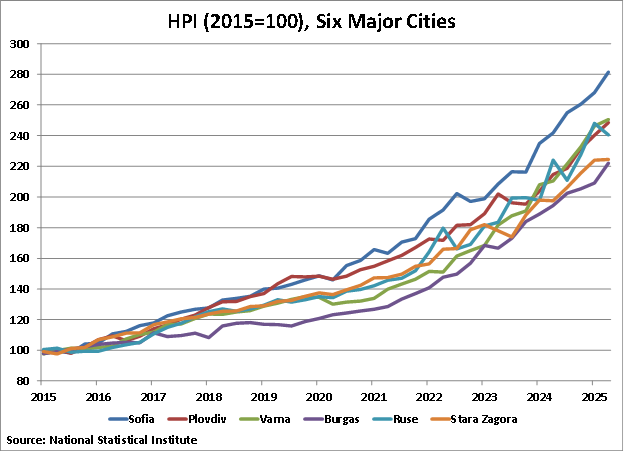
Historic Perspective:
Bulgaria's housing cycle
In the past decade, almost zero interest rates on bank deposits have encouraged people to invest in real estate. That's why the housing market started to rise in 2014 and has been accelerating ever since. From 2014 to 2023, nationwide house prices soared by 101.5%. But when adjusted for inflation, house prices were up by a more conservative 41% over the same period.
This fully offset the massive crash in 2009-13 caused by the global financial crisis and the eurozone debt crisis.
During the global financial crisis, Bulgarian house prices plunged by a cumulative 35.2%. The crash was even more severe in real terms, at -41.5%.
But prior to the said global crisis, Bulgaria experienced a massive boom, with residential property prices surging around 300% from 2000 to 2008.
| HOUSE PRICE INDEX, ANNUAL CHANGE (%) | ||
| Year | Nominal | Inflation-adjusted |
| 2009 | -25.72 | -26.14 |
| 2010 | -4.96 | -9.08 |
| 2011 | -5.81 | -8.33 |
| 2012 | -1.30 | -5.33 |
| 2013 | -1.20 | 0.40 |
| 2014 | 2.78 | 3.69 |
| 2015 | 3.98 | 4.37 |
| 2016 | 8.11 | 8.01 |
| 2017 | 8.15 | 5.24 |
| 2018 | 5.54 | 2.79 |
| 2019 | 6.21 | 2.31 |
| 2020 | 5.40 | 5.25 |
| 2021 | 9.38 | 1.51 |
| 2022 | 13.37 | -3.00 |
| 2023 | 10.07 | 5.14 |
| 2024 | 18.27 | 15.71 |
| Sources: National Statistical Institute, Global Property Guide | ||
Demand Highlights:
Property transactions continue to increase
Bulgaria's property demand has experienced notable fluctuations over the past several years, shaped by cycles of rapid expansion, pandemic-induced disruptions, and subsequent recovery. From 2018 to 2019, year-on-year changes in both the number and value of property transactions moved moderately, with occasional dips but generally positive growth highlighted by strong increases in late 2019 when transaction volumes rose by 8.8% and values jumped 21.2%.
However, the onset of the Covid-19 pandemic in 2020 triggered sharp declines, particularly in the second quarter when transaction numbers collapsed by 28.3% and values fell by 22.5%, marking the market's most severe contraction in the period observed.
A strong rebound followed in 2021, driven by pent-up demand and renewed consumer confidence. The said year marked the market's most dynamic phase, with exceptional surges such as a 65.7% rise in transaction volumes and a remarkable 78.1% increase in transaction values in the second quarter.
Momentum remained high through 2022, though it began to cool toward the end of the year amid inflationary pressures, rising borrowing costs, and broader economic uncertainty. By late 2022 and throughout most of 2023, Bulgaria saw negative annual growth, indicating a period of stabilization and recalibration.
The market regained strength in 2024 and early 2025, with consistent year-on-year increases in both transaction numbers and values. Growth became more moderate but steady, suggesting healthier, more sustainable activity compared to the volatility of earlier years. In the second quarter of 2025, the number of residential property transactions in Bulgaria rose by a modest 2.8% from a year earlier, following y-o-y growth of 2.9% in the previous quarter and 9.9% a year ago, according to figures from the NSI. On the other hand, transaction value experienced a more rapid growth of 23% y-o-y in Q2 2025, after increasing by 21.5% in the previous quarter and 30.2% a year earlier.
In Q2 2025:
- New dwellings: the number of transactions rose by 4.1% y-o-y in Q2 2025, a sharp deceleration from a huge growth of 20.4% in the prior year. Similarly, transaction value continued to increase strongly by 26.4% from a year earlier, following a huge growth of 43.2% in Q2 2024.
- Existing dwellings: the number of transactions rose by 2.3% y-o-y in Q2 2025, following an annual expansion of 6% in the previous year. Likewise, transaction value also increased strongly by 20.7%, at par with the prior year's 22.7% growth.
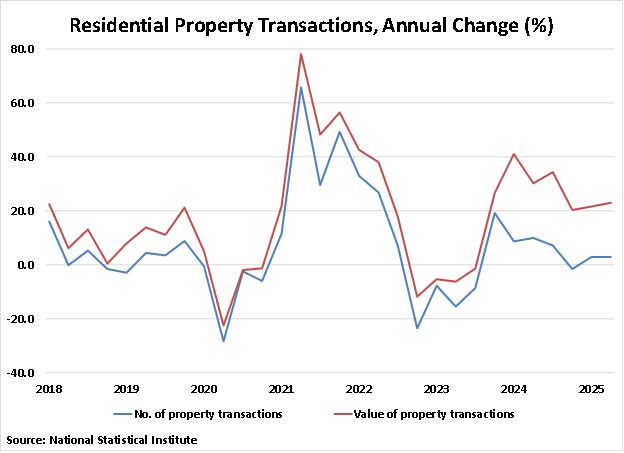
Most sought-after locations in Sofia
Sofia, Bulgaria's capital city, remains one of the most preferred locations in the country. In Q3 2025, the average price of residential properties in the city reached €2,310 per square meter (sqm), according to figures from Bulagrian Properties. This marked the highest growth since the inflation peak in 2022.
Since 2020, property prices in Sofia have doubled, but average salaries have risen at a comparable pace, helping maintain overall housing affordability. According to Bulgarian Properties, about 1.2 average monthly salaries in Sofia are required to purchase one square meter of residential property.
Prices for newly built homes have also surged, rising from €1,700-€1,800 per sqm at the end of 2024 to more than €2,200 per sqm in 2025.
According to Colliers International's Real Estate Market Report H1 2025:
- For single houses, the average sales price was €625,000 in H1 2025, up strongly by 25% from €500,000 in H2 2024.
- For twin houses, the average sales price stood at €550,000 in H1 2025, up by 22.2% as compared to €450,000 in the previous period.
- For row houses, the average sales price was €400,000 in H1 2025, up by 21.2% from €330,000 in the previous period.
Historically, the most expensive area in Sofia is Doctor's Garden, with an average price of nearly €4,000 per sqm. It was followed by the districts of Yavorov and Ivan Vazov, with prices over €3,200 per sqm. Residential property prices are also high in the Medical Academy, Izgrev, and Iztok, at an average of about €2,900 per sqm.
Sofia's Southern districts are currently experiencing strong interest from both locals and foreign homebuyers. In Lozenets and the city center, demand remains high despite the fact that these locations have one of the highest property prices in the country, currently at an average of €2,200 per sqm.
Strelbishte and Gotse Delchev are also preferred neighborhoods with property prices ranging from €1,300 to €1,800 per sqm.
The Krastova Vada and Hladilnika districts, particularly along Cherni Vrah Boulevard and around the Paradise Center shopping mall, are also popular because of their amenities, trade centers, improved infrastructure, proximity to Vitosha Mountain, and the future opening of metro stations. The average residential property price in Kraskova Vada currently stands at about €1,450 per sqm.
Other districts currently experiencing strong demand include Studentski Grad and Vitosha because of the availability of newly built homes at affordable prices. The average price of dwellings in Vitosha is currently at €1,250 per sqm, while it is €1,150 per sqm in Studentski Grad. Manastirski Livadi, Mladost, and Vrabnitsa districts are also popular with average residential property prices ranging from €1,000 to €1,500 per sqm.
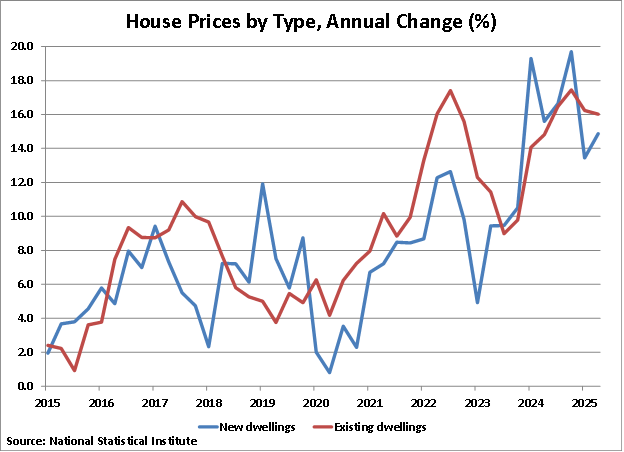
Seaside resorts are thriving
Bulgaria's sea and mountain resorts continue to perform strongly, supported by steady demand from both local and foreign buyers. As noted by Bulgarian Properties, this resilience is driven by a combination of factors, including:
- Increased need for a private place to retreat outside the big, crowded cities;
- Ability to work remotely, which turned some vacation properties into long-term residences, and;
- An increasing number of people are investing in safe assets like real estate due to high, fluctuating inflation.
As a result, transaction volumes in Bulgarian resorts are rising strongly. "Bulgarians are the main buyers on the holiday property market in Bulgaria. There is a year-round revival in the seaside settlements, and the great interest in holiday resorts in Nessebar municipality makes it the fourth largest property market," said Polina Stoykova of Bulgarian Properties.
Stoykova also stated that Bulgaria's holiday property market recovered quickly during the pandemic years. Bulgarians remain the main buyers, but the country is witnessing an increasing number of foreign homebuyers in seaside resorts, particularly in Bansko and Sunny Beach.
"There is a huge interest in properties in Nessebar and other resorts in the municipality (Sunny Beach, Sveti Vlas, Ravda, Elenite), with it becoming the fourth largest property market in the country. This year, it is expected to be one of the leading places in terms of the number of transactions," Stoykova added.
In Sunny Beach, the country's largest resort, the average residential property price stood at around €1,100 per sqm. Bansko's property prices are not far, ranging from €800 to €1,100 per sqm.
In the neighboring Sveti Vlas, which offers many seaside properties, prices were typically more than €1,000 per sqm.
South of Bourgas, apartments with sea views in Sozopol, Chernomorets, and Lozenets remain some of the most popular. Top complexes offer properties at €2,000 to €2,700 per sqm, but one can still fetch properties at €1,000 to €1,500 in other locations.
In Borovets, a well-known ski resort located at the heart of the stunning Rila Mountains, apartments are sold for €1,200 to €1,500 per sqm.
Pomorie is also gaining popularity among investors, especially from Bulgarians and Russian buyers. Also, the regions of Kayarna, Byala, and Blachik near the Northern Black Sea coast have recently seen an increase in buyer interest.
Investors are looking for investments that provide capital gains and rental returns. Holiday homes in seaside and ski resorts are now considered attractive as rental income investments. Most properties are purchased for cash.
Supply Highlights:
Residential construction activity strengthens
After slowing last year, residential construction activity is improving again. In the first three quarters of 2025, the total number of dwelling completions in Bulgaria rose by 10.7% y-o-y to 16,565 units, according to NSI figures. Likewise, the useful floor area of newly built dwellings also increased by 10.9% y-o-y to 1.58 million square meters.
Though the national figure conceals wide regional variations. In the first three quarters of 2025:
- North-West region: dwelling completions increased by 4.7% y-o-y to 357 units, a deceleration from a strong growth of 15.9% in the same period in the preceding year.
- North Central region: dwelling completions were up by 4.2% y-o-y to 520 units, an improvement from a decline of 7.6% in the same period last year.
- North-East region: dwelling completions fell slightly by 0.7% y-o-y to 2,236 units, following a contraction of 6.2% in the same period last year.
- South-East region: completions decreased by 6.3% y-o-y to 3,081 units, following a sharp decline of 17.5% in the previous year.
- South-West region: dwelling completions surged by 27.7% y-o-y to 7,687 units, in stark contrast to a huge decline of 36.5% in the same period last year.
- South Central region: completions increased by a modest 4.8% y-o-y to 2,684 units, in contrast to a decline of 12.1% in the same period last year.
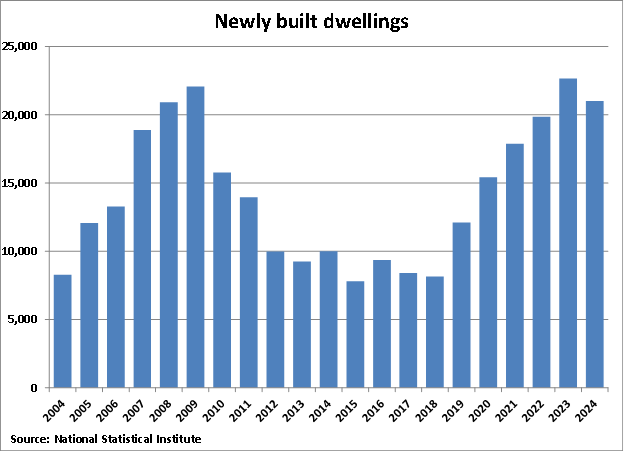
From 2005 to 2011, 16,700 dwelling units were completed every year. Construction peaked in 2009 when the number of dwellings completed exceeded 22,000 units. However, completions then fell sharply, and in 2018 only 8,136 units were built - a similar low level to previous years since 2010. Construction activity bounced back strongly in 2019, with the total number of newly built dwellings surging almost 49% y-o-y to 12,105 units, according to the NSI.
Despite the Covid-19 pandemic, residential construction activity continued to surge. Dwelling completions rose by 27.3% to 15,415 units in 2020, by 15.9% to 17,868 units in 2021, and by another 11.1% to 19,847 units in 2022.
Construction activity expanded further in 2023, with the total number of dwellings completed increasing by another 14.1% to 22,649 units - surpassing the previous peak of 22,058 units seen in 2009.
Then in 2024, dwelling completions in Bulgaria fell by 7.3% y-o-y to 20,998 units. Despite the decline, it remains the second-highest level recorded since 2009.
By end-2024, the total dwelling stock in the country rose slightly by 0.5% y-o-y to 4,324,193 units, according to the NSI.
The total dwelling stock rose slightly by 0.5% y-o-y to 4,304,231 units in 2023, according to the NSI. The South-West region accounts for more than 30% share of the total stock. It was followed by the South Central region, with 18.2% share, the South-East region (15.9%), the North-East region (12.7%), the North-West region (12%), and the North Central region (10.8%).
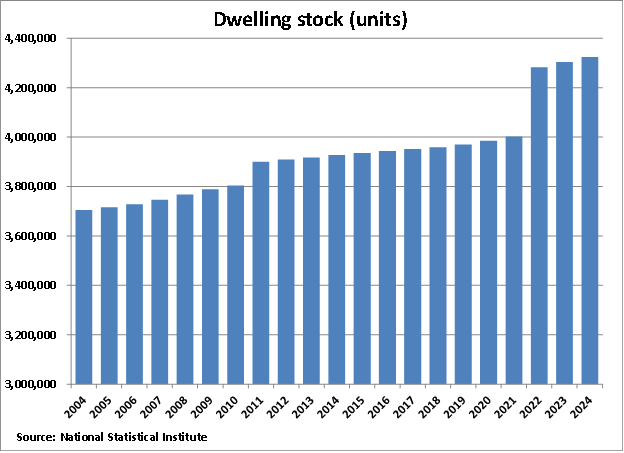
Rental Market:
Moderate rental yields, stable rent prices
Bulgaria has moderate gross rental yields - i.e., the rental return on a property if fully rented out, before all expenses. In Q3 2025, the nationwide gross rental yields averaged 4.29%, slightly down from 4.53% in the previous quarter and from 4.65% in Q2 2024, based on recent research conducted by the Global Property Guide. Yields in the country were almost unchanged in the past few years.
Bulgaria's rent price index:
Note: Bulgaria Rent Price Index, % change 1 yr
Data Source: OECD.
The average gross rental yield in Bulgaria stands at 4.29% (Q3, 2025). Previously, in Q2 2025, the rental yield was 4.53% but a different source was used.
In Sofia, gross rental yields averaged 4.19% in Q3 2025, slightly up from 4% in Q2 2024. Doctor's Garden, Ivan Vazov, Iztok, and Lozenets are among the most sought-after addresses in the center. Embassies, museums, and universities are located here. These areas also have many parks and green spaces, making them popular with expats.
In the southern part of Sofia, in Vitosha Mountain (or in the vicinity), are prestigious suburban neighborhoods like Boyana and Dragalevtsi.
For those who are really chasing yields, Vitosha and Studentski Grad apartments may be worth considering, with gross rental yields of about 5% or higher for the smaller sizes. However, for larger apartments, yields also mirror the city's average of about 4%.
Outside Sofia:
- In Varna, apartments offer gross rental yields ranging from 3.07% to 5.12%, with a city average of 4.08% in Q3 2025.
- In Plovdiv, apartments offer gross rental yields slightly higher than the national figures, ranging from 2.86% to 6.2%, with a city average of 4.7%.
- In Stara Zagora, gross rental yields ranged from 4.02% to 5.14%, with a city average of 4.58%.
- In Burgas, rental yields ranged from 3.82% to 5.28%, with a city average of 4.57% in Q3 2025.
- In Shumen, apartments offer returns from 3.97% to 4.4%, with a city average of 4.19%.
Transaction costs in Bulgaria are moderate and more or less evenly split between buyer and seller.
In Sofia, rental prices are stabilizing. In the third quarter of 2025:
- Studio to one-bedroom apartments: the average monthly rent ranged from €400 to €700, nearly unchanged from the previous year.
- Two-bedroom apartments: the average monthly rent ranged from €700 to €1,000.
- Three-bedroom apartments: rents averaged €1,400 to €1,800 per month, at par with the previous year.
- Houses: monthly rental rates start at €2,100, also comparable to the previous year.
Mortgage Market:
Interest rates gradually declining
The overall level of interest rates in Bulgaria is now gradually decreasing. In September 2025, the average mortgage interest rate for BGN-denominated loans was 2.47%, slightly down from 2.53% in the same period last year and 2.61% two years ago, according to figures from the Bulgarian National Bank.
Bulgaria's mortgage loan interest rates:
Note: Effective annual interest rate in Lev mortgages
Data Source: Bulgarian National Bank.
Likewise, the average mortgage rate for euro-denominated loans fell to 2.55% in September 2025, down from 3.09% in the previous year and from 3.51% two years earlier.
This is not surprising given the recent monetary policy shift implemented by the European Central Bank (ECB), as inflationary pressures ease in the region. In October 2025, ECB kept interest rates steady for the third straight meeting, reflecting its confidence in the eurozone's economic resilience and the continued slowdown in inflation. The main refinancing rate was maintained at 2.15%. Likewise, the deposit facility rate and the marginal lending facility remained unchanged at 2.00% and 2.40%, respectively.
"The Governing Council today decided to keep the three key ECB interest rates unchanged. Inflation remains close to the 2% medium-term target, and the Governing Council's assessment of the inflation outlook is broadly unchanged. The economy has continued to grow despite the challenging global environment. The robust labour market, solid private sector balance sheets, and the Governing Council's past interest rate cuts remain important sources of resilience," said the ECB in its October 2025 Monetary Policy Decision. "However, the outlook is still uncertain, owing particularly to ongoing global trade disputes and geopolitical tensions."
For BGN-denominated loans, in September 2025:
- Interest rate fixation (IRF) of up to 1 year: 2.47%, slightly down from 2.53% in September 2024 and from 2.6% two years ago.
- IRF over 1 and up to 5 years: 3.25%, not significantly different from 3.27% recorded in both September 2024 and September 2023.
- IRF over 5 and up to 10 years: 4.33%, up from 3.56% a year earlier and 3.45% two years ago.
- IRF over 10 years: 4.07% in July of this year, up from 3.49% at the beginning of 2024 and from 3.24% two years ago.
For Euro-denominated loans, in September 2025:
- IRF of up to 1 year: 2.54%, down from 3.06% in September 2024 and from 3.51% in September 2023.
- IRF over 1 and up to 5 years: 2.94%, down from 3.71% in the previous year and from 3.76% two years ago.
- IRF over 5 and up to 10 years: 4.07% in September 2024, up from 3.56% in the same period last year and 3.04% two years earlier
- IRF over 10 years: 4.07% by end-2023, unchanged from the previous year, as well as two years ago
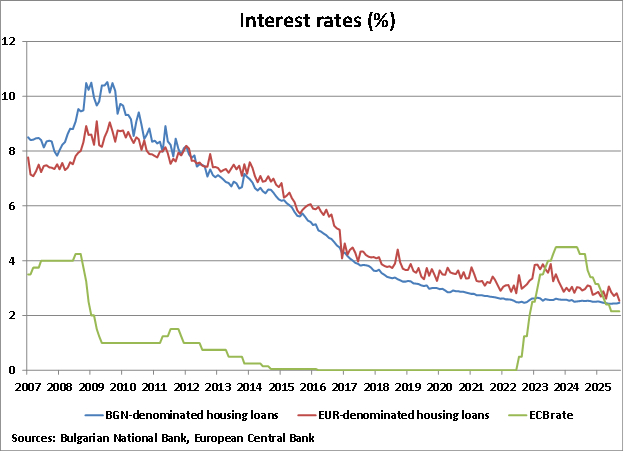
Housing loans growing rapidly
Bulgaria's mortgage market continues to grow strongly, amidst gradually declining interest rates. In the first nine months of 2025, the volume of new housing loans drawn rose by a spectacular 26.4% y-o-y to BGN 9.71 billion (€4.96 billion).
As a result, the total outstanding housing loans increased sharply by 28% to BGN 30.58 billion (€15.64 billion) in September 2025 from the same period last year, following annual growth of 27% in 2024, 21.5% in 2023, 17.9% in 2022, and 16.5% in 2021, according to the Bulgarian National Bank.
About 96.6% of the outstanding housing loans as of September 2025 are BGN-denominated, with an initial rate fixation (IRF) of over 5 years.
The mortgage market experienced massive expansion during the boom years. From just 0.38% of GDP in 2000, the size of the mortgage market grew to about 12.5% of GDP in 2024.
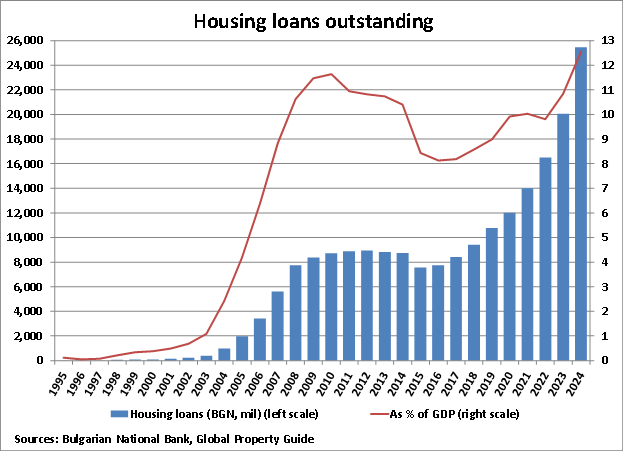
Socio-Economic Context:
Economic conditions improving, labor market remains tight
During 2024, Bulgaria's economy expanded by a moderate 3.4% from a year ago, following annual growth of 1.9% in 2023, 4% in 2022, and 7.8% in 2021, driven primarily by domestic consumption, as well as public and private investment.
"Domestic demand is driving a robust expansion of the Bulgarian economy. GDP grew by 3.4 percent in 2024 and by 3.2 percent in the first half of 2025, propelled by sustained private consumption underpinned by strong credit growth and fiscal easing," said the IMF. "Inflation accelerated in early 2025 and remains elevated. With record low unemployment, the labor market is tight, and real wages are growing rapidly."
In the third quarter of 2025, the country's economic growth stood at 3.2% from a year earlier, following a year-on-year expansion of 3.4% in the previous quarter and 2.8% a year ago, based on NSI figures. Quarter-on-quarter, the economy grew by 0.7% in Q3 2025, slightly easing from a 0.9% gain the previous period.
Economic growth this year is projected to remain modest, with the European Commission and the IMF both expecting the Bulgarian economy to post another growth of 3% this year.
"The near-term growth outlook is positive. Growth is projected to remain at around 3 percent in 2025 and 2026, supported by domestic consumption and public investment funded under the Resilience and Recovery Plan (RRP)," noted the IMF.
Before it contracted by 3.2% in 2020 due to the COVID-19 pandemic, the Bulgarian economy had been expanding by an annual average of 3.2% in 2015-19, sharply up from an average growth of 0.2% in 2009-14.
Bulgaria is moving closer to a major milestone with the planned adoption of the euro in January 2026. Joining the euro area is expected to provide a near-term boost to the economic outlook while strengthening institutions, enhancing policy credibility, and supporting medium-term growth.
Despite a challenging political environment marked by a minority government in place since January 2025, following the seventh parliamentary election in just four years, the country has made notable progress. The 2025 budget has been approved, the EU Recovery and Resilience Plan has been successfully renegotiated, and preparations for euro adoption continue to advance steadily.
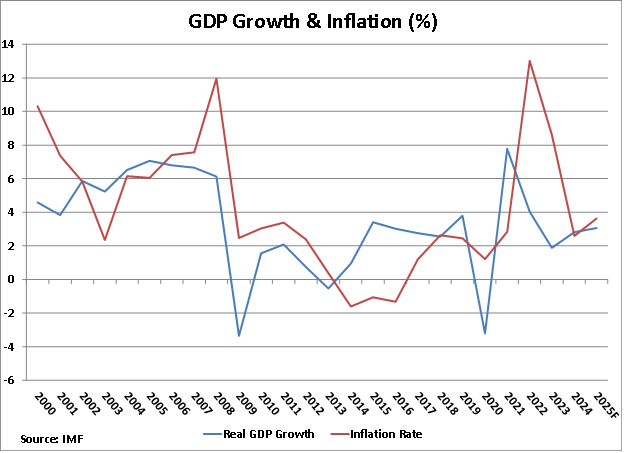
Inflationary pressures remain manageable. In October 2025, the nationwide inflation rate was 5.3%, slightly down from 5.6% in the previous month but far higher than the 1.8% recorded in the same period last year.
From an annual average of just around 1% in the past decade, inflation accelerated to 13% during 2022 and stayed elevated at an average of 8.6% in 2023, amidst the surge in food and energy prices. During 2024, inflation eased to 2.6%.
Overall inflation in Bulgaria is expected to average 3.5% this year and 2.9% in 2026, based on forecasts released by the European Commission.
"HICP inflation is expected to reach 3.5% in 2025, following an increase in VAT rates on bread and restaurant meals, higher excise duties on tobacco, and an increase of administered prices of gas, heating, and electricity. In addition, food prices have surged for most of the year due to higher import prices," said the European Commission. "In 2026, inflation is expected to moderate to 2.9% as the effects of the administered price hikes fade."
The labor market remains strong. In September 2025, the overall unemployment rate was 5.1%, slightly down from 5.2% both in the previous month and a year earlier, according to the Ministry of Labour and Social Policy of the Republic of Bulgaria.
Nationwide unemployment averaged 10.8% in 2010-16, before falling to an annual average of 4.9% in 2017-24.
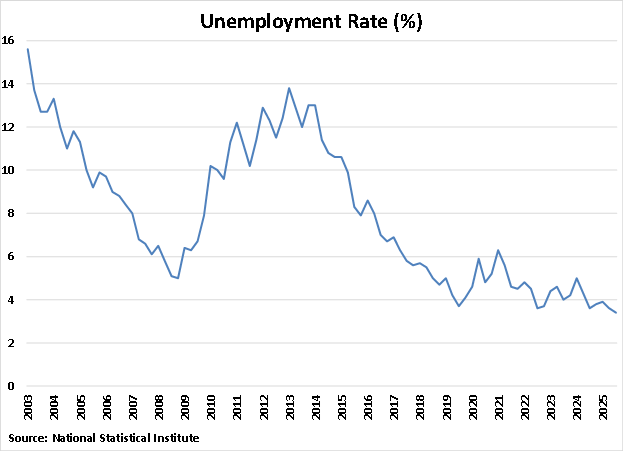
Bulgaria under continued fiscal stress
During 2024, Bulgaria's fiscal position weakened, with the general government budget deficit widening to BGN 6.16 billion (€3.15 billion), equivalent to 3.0% of GDP, according to final data from the NSI. This marked a reversal from 2023, when the deficit stood at just BGN 3.68 billion (€1.88 billion) or approximately 2.0% of GDP.
Government debt also increased last year, reaching BGN 48.85 billion (€24.98 billion), which is equivalent to about 23.8% of GDP - up from around 22.9% of GDP in 2023. The increase reflects higher borrowing to meet spending commitments and support priority programs.
Preliminary figures for 2025 indicate that fiscal pressures remain elevated. By September, the cumulative deficit had already reached BGN 6.05 billion (€3.09 billion), or roughly 2.7% of estimated GDP, signaling ongoing challenges despite efforts to stabilize public finances.
"The general government debt-to-GDP ratio is forecast to increase from 23.8% in 2024 to 28.5% in 2025, then to 30.6% in 2026 and 32.6% in 2027. The large increase in 2025 comes from debt refinancing operations and planned capital injections into the Bulgarian Energy Holding and the Bulgarian Development Bank," said the European Commission.
With euro adoption planned for January 2026, Bulgaria continues to navigate a complex fiscal environment, balancing consolidation needs with investment priorities and broader economic obligations.
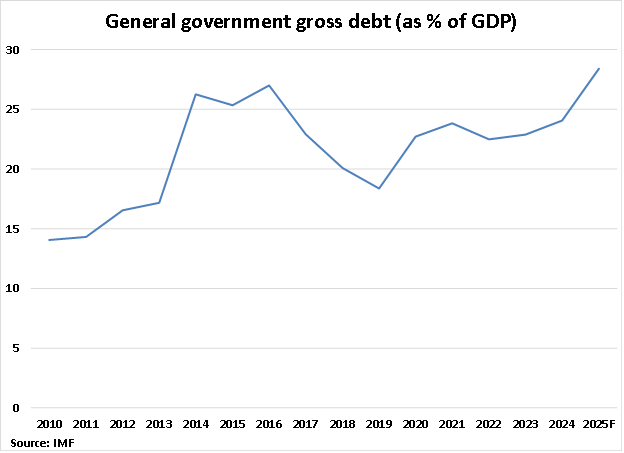
Sources:
- Housing price statistics (National Statistical Institute): https://www.nsi.bg/
- Prices in Sofia reach record highs - discover the latest trends and what to expect in 2026 (Bulgarian Properties): https://www.bulgarianproperties.com/
- Bulgarian Properties Agents of November 2025 (Bulgarian Properties): https://www.bulgarianproperties.com/
- The housing market in Bulgaria at the start of 2025 - summary and forecast (Bulgarian Properties): https://www.bulgarianproperties.com/
- Polina Stoykova at REAL ESTATE BUSINESS FORUM: The housing market in Sofia is calming down under the pressure of high prices (Bulgarian Properties): https://www.bulgarianproperties.com/
- New chapter for the holiday homes in Bulgaria - market report (Bulgarian Properties): https://www.bulgarianproperties.com/
- Bansko and Nessebar are a hit on the holiday property market in Bulgaria (Bulgarian Properties): https://www.bulgarianproperties.com/
- Real Estate Market Overview H2 2024 | Bulgaria (Colliers International): https://www.colliers.com/
- Real Estate Market Overview H1 2025 | Bulgaria (Colliers International): https://www.colliers.com/
- Newly built dwellings completed (National Statistical Institute): https://www.nsi.bg/
- Bulgaria (International Monetary Fund): https://www.imf.org/
- Rental yields in Bulgaria: Sofia and 5 other cities (Global Property Guide): https://www.globalpropertyguide.com/
- Interest rates on loans - households and NPISHs (Bulgarian National Bank): https://www.bnb.bg/
- Key ECB interest rates (European Central Bank): https://www.ecb.europa.eu/
- Monetary policy decisions (European Central Bank): https://www.ecb.europa.eu/
- Economic forecast for Bulgaria (European Commission): https://economy-finance.ec.europa.eu/
- Bulgaria GDP Annual Growth Rate (Trading Economics): https://tradingeconomics.com/
- IMF Executive Board Concludes 2025 Article IV Consultation with Bulgaria (International Monetary Fund): https://www.imf.org/
- Bulgaria: Staff Concluding Statement of the 2025 Article IV Mission (International Monetary Fund): https://www.imf.org/
- Inflation and Consumer Price Indices - October 2025 (National Statistical Institute): https://www.nsi.bg/
- Bulgaria and EU: Deficit and debt of General Government Institutional Sector for 2024 (National Statistical Institute): https://www.nsi.bg/